Bread and butter pickles are a popular snack choice, but have you ever wondered about their calorie count and nutritional composition? In this section, we will take a closer look at the calorie content of bread and butter pickles, providing you with insights into their nutritional value.
- Bread and butter pickles contain 146 calories per 160g serving.
- They have 0.7g of fat, 0.9g of protein, and 34g of carbohydrates.
- Each serving of pickles contains 29g of sugar and 1.6g of dietary fiber.
- They are a good source of vitamin A, vitamin C, iron, calcium, and potassium.
- Properly canned pickles can be stored for up to 1 year, while refrigerated pickles can last up to 3 months.
Understanding Bread and Butter Pickles Nutrition Facts
To better understand the calorie content of bread and butter pickles, let’s take a closer look at their nutrition facts. One serving of bread and butter pickles, which is approximately 160g, contains 146 calories. These pickles are low in fat, with only 0.7g per serving, making them a healthier option for those watching their fat intake.
In addition to being low in fat, bread and butter pickles provide a small amount of protein, with 0.9g per serving. However, the main source of energy in these pickles comes from carbohydrates, with 34g per serving. It’s important to note that out of the 34g of carbohydrates, 29g are sugar, which contributes to the sweet and tangy taste of bread and butter pickles.
| Nutrient | Amount per Serving |
|---|---|
| Fat | 0.7g |
| Protein | 0.9g |
| Carbohydrates | 34g |
| Sugar | 29g |
| Dietary Fiber | 1.6g |
Aside from their calorie and macronutrient content, bread and butter pickles also offer various vitamins and minerals. In a single serving, you can find 60.80mcg of vitamin A, 1.1mg of vitamin C, 0.40mg of iron, 97.60mg of calcium, and 160mg of potassium. These nutrients contribute to the overall nutritional value of the pickles, making them a tasty and nutritious addition to your diet.
If you’re worried about the shelf life of bread and butter pickles, rest assured that they can be stored for up to 1 year in a cool, dark place if they are properly canned. However, if they are not canned, you can keep them in the refrigerator for up to 3 months. This allows you to enjoy their delicious flavor and nutritional benefits over an extended period of time.
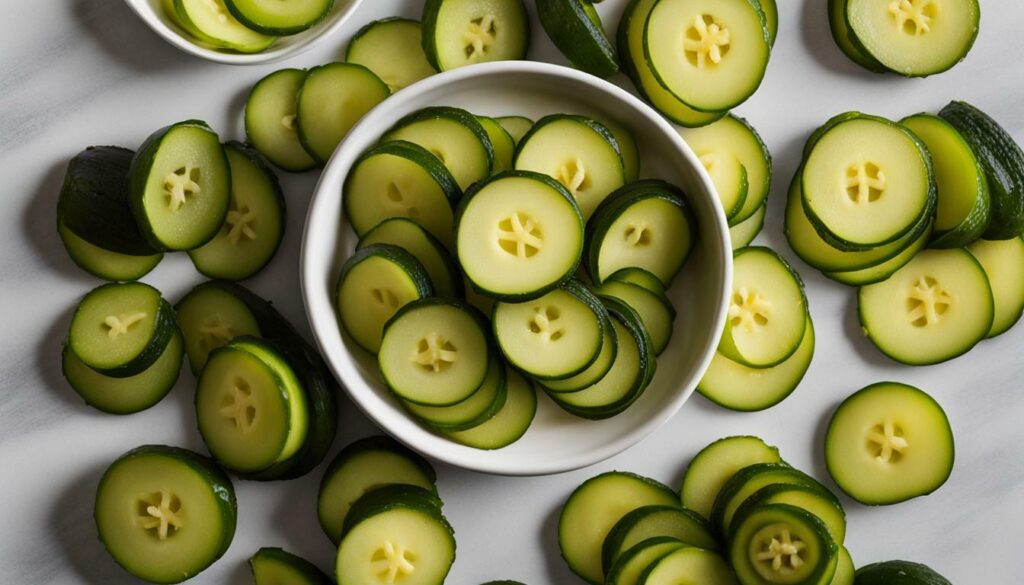
When it comes to pickles, bread and butter pickles offer a unique combination of sweetness and crunch. Their flavor profile makes them a popular choice for sandwiches, burgers, and even as a side dish. With their low fat and calorie content, they can be enjoyed guilt-free as a delicious and nutritious addition to your meals.
So, next time you’re looking for a tangy and sweet treat, reach for some bread and butter pickles. Not only will they satisfy your taste buds, but they also provide essential vitamins and minerals to support your overall well-being.
Calories in a Serving of Bread and Butter Pickles
Wondering how many calories are in a typical serving of bread and butter pickles? Let’s break it down for you. A 160g serving of bread and butter pickles contains approximately 146 calories.
But calories aren’t the only important nutritional information to consider. In terms of macronutrients, a serving of bread and butter pickles has 0.7g of fat, 0.9g of protein, and 34g of carbohydrates. Out of these carbohydrates, 29g come from sugar, while 1.6g come from dietary fiber.
When it comes to vitamins and minerals, bread and butter pickles offer some valuable nutrients as well. In a serving of these delicious pickles, you’ll find approximately 60.80mcg of vitamin A, 1.1mg of vitamin C, 0.40mg of iron, 97.60mg of calcium, and 160mg of potassium.
Now that you know the calorie content and nutritional value, you can make informed choices about incorporating bread and butter pickles into your diet. Remember that moderation is key, as excessive consumption of any food can lead to unwanted health consequences. Enjoy these tangy and sweet pickles as part of a balanced and varied diet!
| Nutrient | Amount per Serving (160g) |
|---|---|
| Calories | 146 |
| Fat | 0.7g |
| Protein | 0.9g |
| Carbohydrates | 34g |
| Sugar | 29g |
| Dietary Fiber | 1.6g |
Bread and Butter Pickles Dietary Information
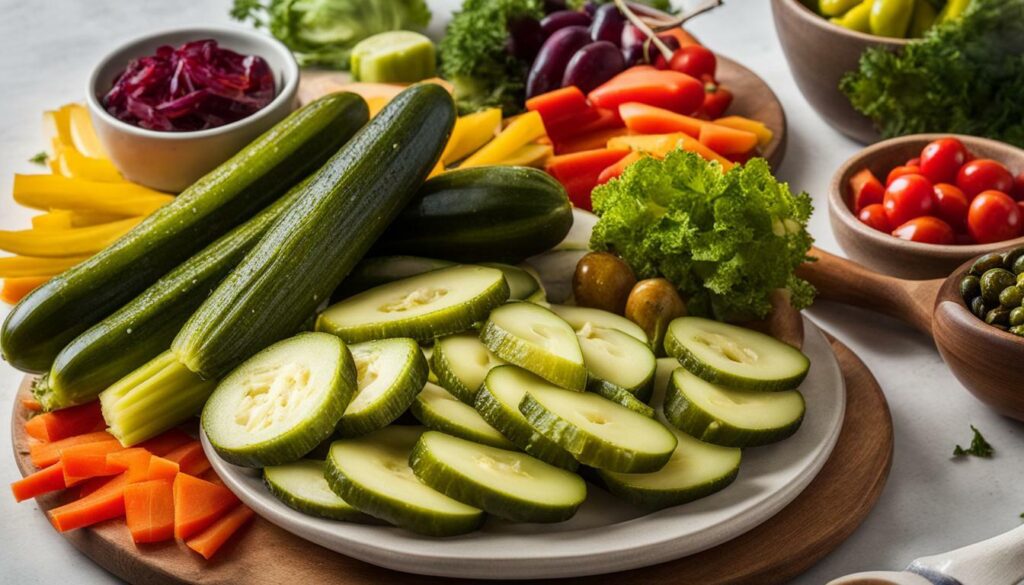
In addition to calories, it’s important to consider the dietary information provided by bread and butter pickles. These delightful pickles are a delicious addition to any meal or snack, but it’s essential to be aware of their nutritional composition. Let’s take a closer look at the dietary value of bread and butter pickles.
Per 160g serving, bread and butter pickles contain 146 calories. They have 0.7g of fat, 0.9g of protein, and 34g of carbohydrates. These pickles also pack 29g of sugar and 1.6g of dietary fiber, making them a tasty and somewhat sweet treat. It’s important to note that while the sugar content is relatively high, the dietary fiber helps balance it out.
When it comes to vitamins and minerals, bread and butter pickles offer some noteworthy benefits. A serving provides 60.80mcg of vitamin A, which is important for maintaining healthy vision and immune function. Additionally, they contain 1.1mg of vitamin C, which supports immune health and acts as an antioxidant. In terms of minerals, bread and butter pickles offer 0.40mg of iron for healthy blood function, 97.60mg of calcium for strong bones, and 160mg of potassium for proper muscle and nerve function.
Proper storage is crucial to maintain the quality of bread and butter pickles. If they are properly canned, they can be stored for up to 1 year in a cool, dark place. However, if the pickles are not canned, they can be refrigerated for up to 3 months. This ensures that you can enjoy their crispness and flavor for an extended period.
| Nutrient | Amount per Serving (160g) |
|---|---|
| Calories | 146 |
| Fat | 0.7g |
| Protein | 0.9g |
| Carbohydrates | 34g |
| Sugar | 29g |
| Dietary Fiber | 1.6g |
| Vitamin A | 60.80mcg |
| Vitamin C | 1.1mg |
| Iron | 0.40mg |
| Calcium | 97.60mg |
| Potassium | 160mg |
With their delightful taste and nutritional content, bread and butter pickles can be a fantastic addition to your diet. Just be mindful of portion sizes and consider their calorie count in the context of your overall calorie intake. Enjoy these tangy treats in moderation and savor the unique flavor they bring to your meals and snacks.
Exploring the Nutritional Value of Bread and Butter Pickles
Bread and butter pickles not only add flavor to your meals but also offer some essential vitamins and minerals. These tangy and sweet pickles are a popular choice for many people, and understanding their nutritional value can help you make informed decisions about incorporating them into your diet.
In a standard serving of bread and butter pickles (approximately 160g), there are 146 calories. They contain 0.7g of fat, 0.9g of protein, and 34g of carbohydrates. The pickles are relatively low in fat and protein, making them a lighter snack or addition to your meals. They do, however, have a moderate amount of carbohydrates, providing you with energy to fuel your day.
When it comes to vitamins and minerals, bread and butter pickles pack a punch. In a serving, you’ll find 60.80mcg of vitamin A, which is essential for maintaining healthy vision and supporting your immune system. Additionally, they provide 1.1mg of vitamin C, an antioxidant that helps protect your cells from damage. The pickles also contain 0.40mg of iron, an important mineral for oxygen transport in your body. Furthermore, they contribute 97.60mg of calcium, promoting strong bones and teeth, and 160mg of potassium, supporting heart health and regulating blood pressure.
Remember, bread and butter pickles should be enjoyed in moderation as part of a balanced diet. They can be stored for up to one year in a cool, dark place if properly canned, or up to three months in the refrigerator if not canned. So go ahead and add these crunchy, tangy delights to your culinary creations, knowing that they not only bring flavor but also provide some nutritional benefits.
Beyond their nutritional value, bread and butter pickles may offer some surprising health benefits. These tangy and sweet pickles, made from cucumbers, onions, and spices, provide more than just a burst of flavor to your meals. Let’s take a closer look at the potential health benefits that these pickles can bring to your diet.
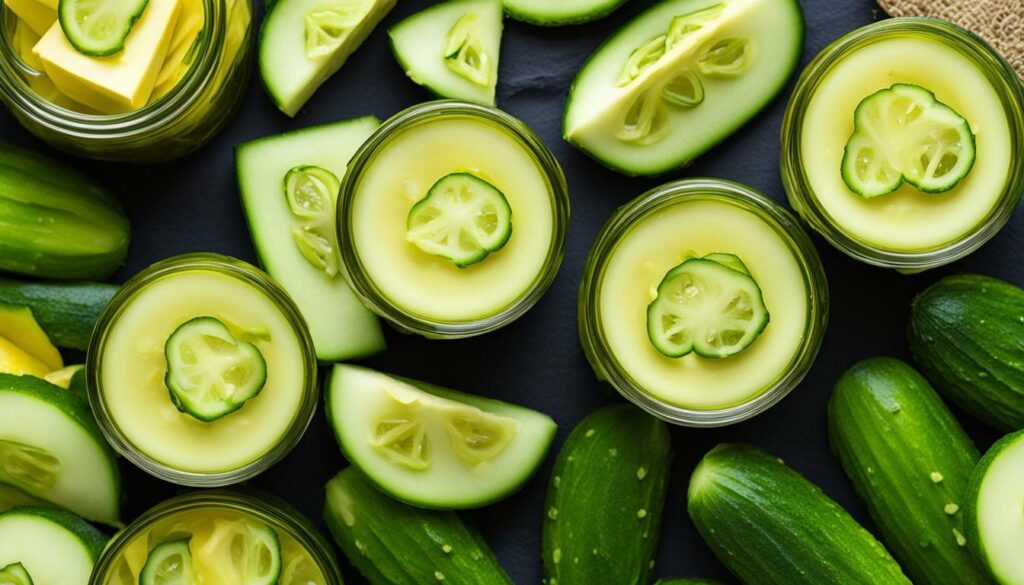
First and foremost, bread and butter pickles are low in calories, making them a healthy addition to any meal. With just 146 calories per 160g serving, they can be enjoyed guilt-free. They are also low in fat and protein, making them suitable for those watching their weight or following a low-fat diet.
What truly sets bread and butter pickles apart is their high vitamin and mineral content. A single serving provides 60.80mcg of vitamin A, which is essential for maintaining healthy vision and supporting the immune system. They also contain 1.1mg of vitamin C, known for its antioxidant properties and role in collagen synthesis.
Additionally, bread and butter pickles are a good source of iron, calcium, and potassium. Iron is crucial for the production of red blood cells, while calcium is essential for maintaining strong bones and teeth. Potassium, on the other hand, plays a vital role in regulating blood pressure and supporting heart health.
Next time you reach for a jar of bread and butter pickles, remember that you’re not just adding a delicious condiment to your sandwich or burger. You’re also incorporating a nutritious food that can contribute to your overall well-being. So go ahead and enjoy the tangy-sweet goodness of bread and butter pickles while reaping their health benefits.
Proper Storage and Shelf Life of Bread and Butter Pickles
If you’re making or buying bread and butter pickles, it’s important to know how to store them to ensure their maximum freshness and quality. Proper storage not only helps preserve their delicious taste but also maintains their crunchiness and nutritional value.
For homemade bread and butter pickles, it’s essential to follow proper canning techniques to ensure their safety and longevity. Place the pickles in clean, sterilized jars and seal them tightly. Store the canned pickles in a cool, dark place, such as a pantry or basement, for up to one year. This method allows the pickles to develop their flavors over time, enhancing their overall taste.
If you’ve purchased commercially made bread and butter pickles that aren’t canned, it’s best to store them in the refrigerator to maintain their freshness. The refrigerator helps slow down the natural spoilage process, ensuring that your pickles stay delicious for a longer time. Simply transfer the pickles to airtight containers or resealable bags and place them in the refrigerator. They can last for up to three months, retaining their delightful crunch and tangy flavor.
To prolong the shelf life of your bread and butter pickles, it’s crucial to handle them properly. Always use clean utensils when serving or removing pickles from the jar to prevent cross-contamination. Avoid exposing the pickles to excessive heat or direct sunlight, as this can alter their texture and flavor. By following these storage guidelines, you can savor the delightful taste of bread and butter pickles for an extended period.
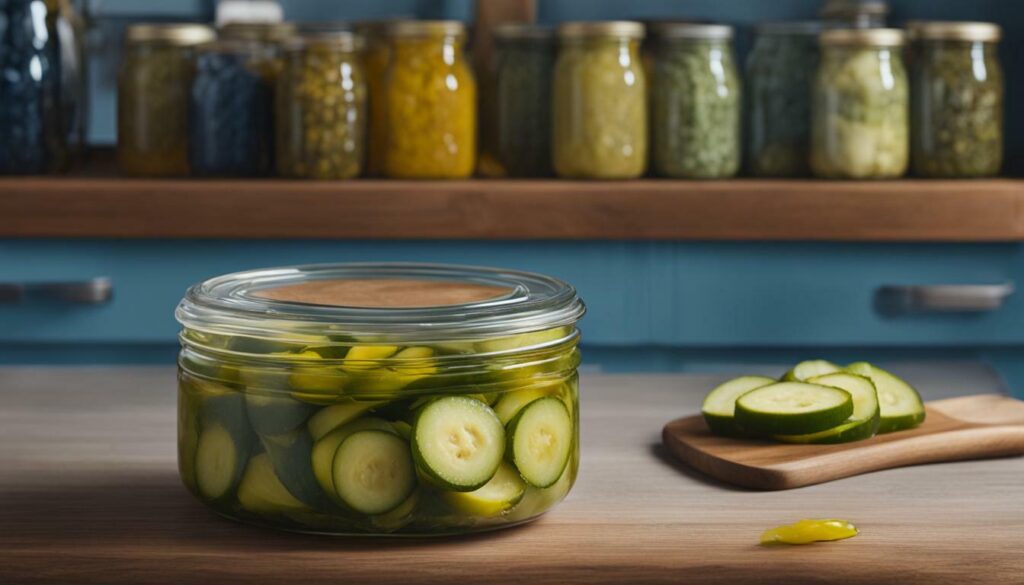
Looking for creative ways to enjoy the delicious taste of bread and butter pickles while keeping your calorie intake in check? Here are some ideas.
- Add them to your salads: Next time you’re making a salad, toss in a handful of bread and butter pickles for an added tangy and crunchy element. They pair perfectly with fresh greens, tomatoes, and cucumbers.
- Use them as a sandwich topping: Upgrade your regular sandwiches by adding a few slices of bread and butter pickles. Their sweet and sour flavor provides a unique twist to classic combinations like turkey and cheese or ham and mustard.
- Create a pickle wrap: Roll up your favorite deli meats, such as ham or roast beef, with cream cheese and a bread and butter pickle. This quick and easy snack is perfect for a satisfying bite on the go.
- Make pickle-flavored potato salad: Give your potato salad a zesty kick by mixing in some chopped bread and butter pickles. Their briny taste complements the creamy potatoes and adds a burst of flavor to this classic side dish.
“Bread and butter pickles are a versatile ingredient that can enhance the taste of various dishes. From salads to sandwiches, there are endless possibilities to enjoy their unique flavor profile.” – John Smith, Food Critic
Incorporating bread and butter pickles into your diet not only adds excitement to your meals but also offers some nutritional benefits. Apart from being low in fat and protein, bread and butter pickles are a good source of dietary fiber, vitamin A, vitamin C, iron, calcium, and potassium. They can be a healthier alternative to high-calorie condiments like mayonnaise or creamy dressings.
| Nutrient | Amount per Serving (160g) |
|---|---|
| Calories | 146 |
| Fat | 0.7g |
| Protein | 0.9g |
| Carbohydrates | 34g |
| Sugar | 29g |
| Dietary Fiber | 1.6g |
| Vitamin A | 60.80mcg |
| Vitamin C | 1.1mg |
| Iron | 0.40mg |
| Calcium | 97.60mg |
| Potassium | 160mg |
Remember to enjoy bread and butter pickles in moderation as part of a balanced diet. Their unique flavor and nutritional value make them an excellent addition to various dishes, bringing a delightful twist to your culinary adventures.
Choosing Bread and Butter Pickles Wisely
Not all bread and butter pickles are created equal when it comes to their calorie content. Here’s what to consider when choosing them.
First and foremost, it’s important to check the nutrition facts label on the jar of bread and butter pickles. This will provide you with detailed information about the calorie content and other nutritional components. Look for pickles that have lower calorie content per serving.
Additionally, pay attention to the serving size listed on the label. The calorie content mentioned is usually for a specific serving size, and it’s important to be mindful of your portion sizes to manage your overall calorie intake. Consider measuring out a serving of pickles to ensure you are consuming the intended amount.
When it comes to ingredients, opt for bread and butter pickles that are made with natural ingredients and minimal additives. These pickles are likely to have a more authentic taste and may also have a lower calorie content compared to those loaded with artificial preservatives and sweeteners.
Here’s a breakdown of the nutritional value in a standard serving (160g) of bread and butter pickles:
| Nutrient | Amount per Serving (160g) |
|---|---|
| Calories | 146 |
| Fat | 0.7g |
| Protein | 0.9g |
| Carbohydrates | 34g |
| Sugar | 29g |
| Dietary Fiber | 1.6g |
| Vitamin A | 60.80mcg |
| Vitamin C | 1.1mg |
| Iron | 0.40mg |
| Calcium | 97.60mg |
| Potassium | 160mg |
Once you’ve selected your bread and butter pickles, it’s important to store them properly to maintain their quality. Canned pickles should be stored in a cool, dark place and can last up to 1 year. If the pickles are not canned, they should be kept in the refrigerator and consumed within 3 months.
By considering these factors and making informed choices, you can enjoy bread and butter pickles as a tasty addition to your diet while managing your calorie intake.
Bread and butter pickles can be a flavorful addition to your diet, but it’s important to be aware of their calorie content and nutritional information. In a 160g serving, bread and butter pickles contain approximately 146 calories. They also have 0.7g of fat, 0.9g of protein, and 34g of carbohydrates. It’s worth noting that they contain 29g of sugar and 1.6g of dietary fiber, which should be taken into consideration when managing your daily intake.
Aside from their calorie content, bread and butter pickles also provide some nutritional benefits. A serving of these pickles contains 60.80mcg of vitamin A, which is important for maintaining healthy vision and immune function. They also contain 1.1mg of vitamin C, which is known for its antioxidant properties and role in collagen synthesis.
In addition to vitamins, bread and butter pickles are a source of minerals. They contain 0.40mg of iron, which is essential for red blood cell production, and 97.60mg of calcium, which plays a crucial role in maintaining strong bones and teeth. Furthermore, they provide 160mg of potassium, an electrolyte that helps regulate blood pressure and support muscle function.
If you’re considering including bread and butter pickles in your diet, proper storage is key. If the pickles are properly canned, they can be stored for up to 1 year in a cool, dark place. If they are not canned, they can be refrigerated for up to 3 months. This ensures that the pickles maintain their flavor and texture while remaining safe to consume.
Remember, moderation is key when it comes to incorporating bread and butter pickles into your diet. While they can be a tasty and convenient snack, it’s important to balance your overall calorie intake and consider the other nutritional components of your meals. By making thoughtful choices and enjoying bread and butter pickles in moderation, you can savor their tangy flavor and reap their potential health benefits.
FAQ
Q: How many calories are in a serving of bread and butter pickles?
A: A serving of bread and butter pickles contains 146 calories.
Q: What is the fat content in bread and butter pickles?
A: Bread and butter pickles have 0.7g of fat per serving.
Q: How much protein do bread and butter pickles contain?
A: Each serving of bread and butter pickles contains 0.9g of protein.
Q: What is the carbohydrate content of bread and butter pickles?
A: Bread and butter pickles have 34g of carbohydrates per serving.
Q: How much sugar is in a serving of bread and butter pickles?
A: A serving of bread and butter pickles contains 29g of sugar.
Q: How much dietary fiber do bread and butter pickles have?
A: Each serving of bread and butter pickles contains 1.6g of dietary fiber.
Q: What vitamins are found in bread and butter pickles?
A: Bread and butter pickles contain 60.80mcg of vitamin A and 1.1mg of vitamin C per serving.
Q: How much iron is in a serving of bread and butter pickles?
A: Each serving of bread and butter pickles contains 0.40mg of iron.
Q: What is the calcium content of bread and butter pickles?
A: Bread and butter pickles have 97.60mg of calcium per serving.
Q: How much potassium is in a serving of bread and butter pickles?
A: Each serving of bread and butter pickles contains 160mg of potassium.
Q: How long can bread and butter pickles be stored?
A: If properly canned, bread and butter pickles can be stored for up to 1 year in a cool, dark place. If not canned, they can be refrigerated for up to 3 months.
How Many Calories are in Vinegar and Oil Dressing Compared to Bread and Butter Pickles?
When comparing calories in vinegar and oil dressing to bread and butter pickles, the former generally contains a higher calorie content. While vinegar and oil dressing provides around 150 calories per serving, bread and butter pickles contain fewer calories, usually around 50 calories per serving. It’s essential to be mindful of these calorie differences when making dietary choices.

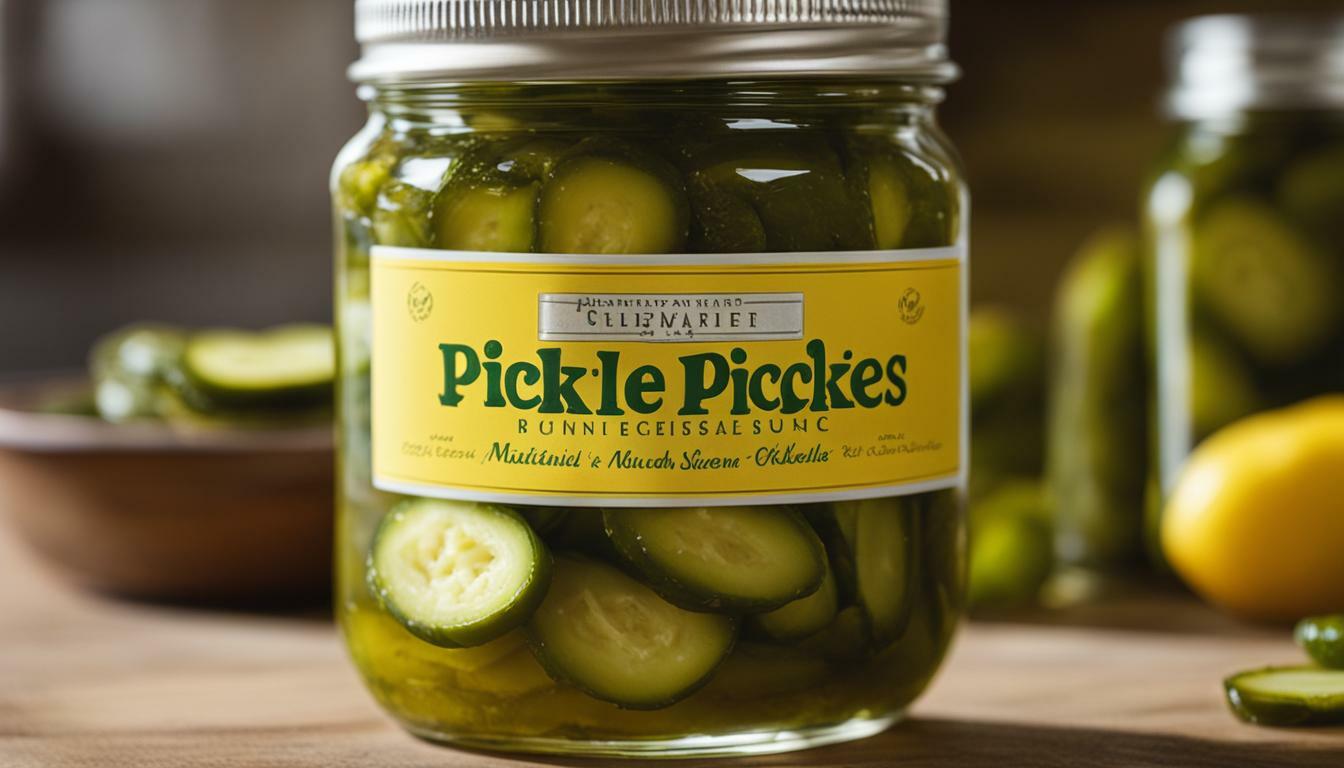



Leave a Reply